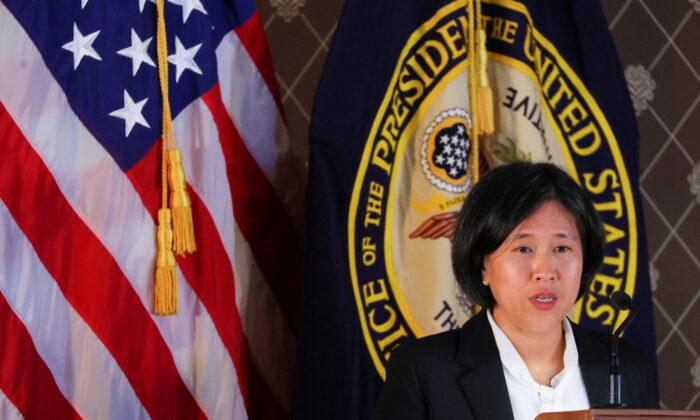Beijing has deliberately fallen far short of both the letter and spirit of World Trade Organization (WTO) rules, requirements, and standards, according to a report issued by the Office of the U.S. Trade Representative (USTR).
Covering calendar year 2021, the document is the 20th such annual report prepared in accordance with the U.S.–China Relations Act of 2000, and assesses both China’s record of WTO compliance and China’s adherence to bilateral commitments made to the United States.
“China has not moved to embrace the market-oriented principles on which the WTO and its rules are based, despite the representations that it made when it joined 20 years ago,” USTR Ambassador Katherine Tai said in a Feb. 16 statement.
The Original Commitment
All nations that have joined the WTO have ostensibly done so with a full understanding of the expectations set forth in the Marrakesh Declaration of April 1994, which marked the end of the Uruguay Round negotiations, the report states. On that occasion, WTO members explicitly affirmed that the nature and purpose of the WTO is to promote a new age of economic cooperation characterized by a fair and transparent multilateral trading system.Adherence to Uruguay Round decisions and agreements meant pursuing open, market-oriented policies, and the members of the WTO understood that an authoritarian, state-dominated approach making use of heavy-handed embargoes and economic coercion was anathema to the commitments they had made.
China entered the WTO in December 2001 on the explicit condition that Chinese leaders agreed to pursue this classical liberal, free-market approach. For their part, other WTO members welcomed China on the understanding that the nation’s leaders would scrap state-dominated mercantilist practices and policies as part of the transition to a free-market system. Because of the amount of progress China needed to make to realize these goals, the nation’s WTO membership came with certain special safeguards providing for regular reviews of that progress and assessments of how far China still had to go.

Expectations Versus Reality
Those who had high hopes for China in the years since its WTO admission may find the report a sobering read.“China has a poor record when it comes to complying with WTO rules and observing the fundamental principles on which the WTO agreements are based—non-discrimination, openness, reciprocity, fairness and transparency,” the report states. “Too often, China flouts the rules to achieve industrial policy objectives. In addition, and of more serious concern to the United States and other WTO members, China has not made sufficient progress in transitioning to a market economy.”
The flouting of WTO rules inflicts serious damage to industries and markets in the United States and other WTO member nations, the report states. Even while failing to play by the rules, Beijing has made use of the benefits of WTO membership, particularly of the access to other nations’ markets that membership entails, in order to become the largest trader in the WTO.
Far from pursuing a free-market approach, Beijing and the CCP have persistently intervened in the workings of businesses in China while limiting the access of foreign service suppliers and manufacturers to Chinese markets. The players that benefit most from this approach are state-owned enterprises and a few select corporations known as “national champions,” the report states.
While conceding that China has met a few of the goals set under the “phase one” trade agreement signed with the U.S. in January 2020, the report notes that China has failed to implement some of the more important provisions of the deal, notably when it comes to conducting risk assessments on the use of ractopamine in swine and cattle. Ractopamine is a feed additive widely used in the United States but banned in China. Moreover, China didn’t come close to meeting its commitment to import at least $200 billion more in U.S. goods and services in 2020–21 than it imported in 2017.
‘Golden Shares’
While state intervention takes many forms, a common intervention in recent years is for the regime is to take “golden shares” in private Chinese firms. The government, making use of a guidance fund or other state-controlled tool, buys a stake in a firm and receives in return a seat on the board of directors or veto rights. This inevitably strengthens the hand of the regime and gives it more direct oversight of the firm’s decisions and operations.Although these practices may be seen as the fading vestiges of Beijing’s habitual management and guidance of the economy, the report emphasizes that these trends have gotten steadily worse, not better, in the years since China’s WTO accession.
“Since new leaders assumed power in China in 2013, the state’s role in the economy—effectuated by the Chinese government and, increasingly, the Chinese Communist Party—has grown,” the report states. “Meanwhile ... the depth and breadth of concerns facing U.S. and other foreign companies doing business in China—or competing with favored Chinese companies in markets outside of China—have similarly increased.”
In the report’s analysis, the reasons for these trends aren’t hard to find. Part of the issue is that, despite Beijing’s explicit agreement to turn sharply in a free-market direction upon entering the WTO, the statutory, or constitutional, basis for state intervention is wholly unchanged. China’s constitution, along with individual directives and measures issued from Beijing, fosters the imperative to promote a “socialist market economy with Chinese characteristics,” the report states.
The report faults the WTO for a dispute settlement mechanism that has proven largely ineffective when the United States and other members have tried to challenge Beijing’s more egregious practices.





